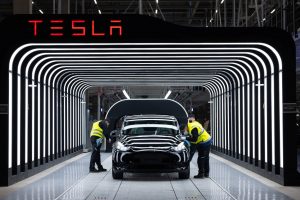Key Points
- 🚗 Tesla’s head start and rapid innovation have made it a dominant force in the electric vehicle (EV) sector.
- 🏭 Traditional automakers are starting to look like niche EV producers compared to Tesla due to its limited vehicle lineup.
- 📊 Tesla’s Model Y and Model 3 are outselling the combined efforts of its 19 closest competitors in the first half of 2023 by a wide margin.
- 📈 Tesla’s production volume far exceeds that of traditional automakers in the EV space, potentially making their businesses unprofitable.
- 🎯 Competing with Tesla in the EV sector is challenging as it remains a moving target, making it difficult for others to catch up.
It is becoming increasingly evident that the United States’ electric vehicle sector, Tesla’s playground, and everyone else is playing by the EV maker’s rules. Thanks to its head start in the industry and its quick pace of innovation, Tesla’s lead in the electric vehicle sector has become very prominent.
So prominent, in fact, that rival automakers are starting to look like niche EV makers that only produce high-priced, low-volume electric cars.
Tesla mostly sells just four vehicles. The Cybertruck, arguably Tesla’s most anticipated car today, is yet to enter production, and the Tesla Semi is yet to be ramped. In comparison, veteran automakers such as General Motors have adopted a more traditional approach by releasing and announcing numerous electric cars for multiple segments.
Tesla’s lineup of cars may be very limited, but the company’s best-sellers, the Model Y crossover and the Model 3 sedan, are dominating the market by a considerable degree. As per data from S&P Global Mobility, Tesla has been able to outsell its next 19 competitors 10 to one during the first six months of 2023.
Tesla sold 325,291 vehicles in the United States from January to June, more than any other automaker. General Motors’ Chevrolet brand with its Bolt was a distant second with 34,943 sales. Ford, Hyundai, and Rivian followed after. The Chevy Bolt sold 35,000 units, while the Ford Mustang Mach-E saw sales of 13,600 units.
It should be noted that the Bolt and the Mach-E were positioned in media reports as rivals to the Model 3 and Model Y. Yet in comparison to the volumes of the Model Y and Model 3, GM and Ford’s EVs are almost like niche electric cars that are only produced in small numbers.
As noted in a Reuters report, such numbers are nowhere near enough volume to fill a typical assembly plant, which usually needs to operate at 80% capacity or more to be profitable. Tesla’s facilities like the Fremont Factory are at full capacity, and the EV maker is establishing larger factories today to meet the growing demand for its vehicles.
Veteran automakers such as Ford and GM have announced high-profile investments related to their electric vehicle programs, but with EV sales being dominated by Tesla, carmakers run the risk of maintaining a business that’s unprofitable. This could result in challenges for experienced carmakers, as producing EVs profitably is an endeavor that even Tesla has found extremely difficult.
Overall, Tesla has achieved a lead in the EV sector, and while competitors are aiming to catch up, the EV maker is a moving target, and thus, is very difficult to overcome.





